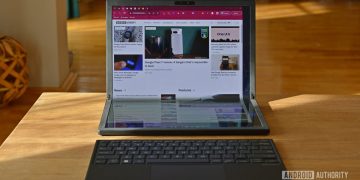Many laptop brands and models are on the market, from powerful desktop replacements and video games laptops to lightweight and compact ultrabooks and high-priced MacBooks to affordable Chromebook brands.
While certain models are designed expressly for specific industries and applications, such as business, students, creatives, and gaming, it is hard to find a laptop designed for programmers. However, there are a few laptops with essential features for coding.
So, if you’re planning to buy a new laptop for your coding, here are eight factors you’ll need to consider.
1. Display
A coder should seriously consider their laptop’s screen—don’t go for just any display. That’s because you’ll spend most of your coding time staring at the screen. Furthermore, displays are also important to people who love online live betting on betting sites like Parimatch.
Here are a few things to keep in mind before deciding on a device:
Big Built-In Screen
If you don’t have you’re comfortable with a less portable device, you can go for devices with larger displays. Small displays, on the other hand, offer more miniature workspace. Consequently, you’ll have to strain more because the icons, text, and other user interface features will be small.
Also, programming requires a vast vertical space; therefore, you should think about 16:10 screens. Most laptop monitors today use a 16:9 aspect ratio, but several alternatives enable you to have more extensive displays on the market.
External Display Support
Most computers allow the connection of an external display through HDMI. This is handy, especially if you have multiple reference windows active concurrently. Unfortunately, the disparity between the bigger external screen and the small built-in display might make your job more difficult.
So, if you’re planning to connect two or more external displays with your computer, you’ll need to confirm whether it can support that. However, most low-end and mid-range laptops can only connect one display through HDMI.
Alternatively, you can opt for a Thunderbolt 4 connection that supports DisplayPort and the HDMI connector. That allows you to connect and use two screens at once.
2. Processor
Like any application, a powerful processor is always preferable. Unfortunately, most high-performing processors are expensive, and not everyone has an unlimited budget. As a result, compare different processors and their prices before settling on one.
Do you use many apps spontaneously? Or work with a lot of data? If so, it would be best to put more value on the cores count than on the raw processing capacity. A fast processor might suit you better if you only use one piece of software.
However, regardless of the type of programming you design, you should aim for a mid-range processor at the very least. This is because low-cost options such as the AMD Ryzen 3 or Intel Core i3 might not be able to finish the projects you need on time.
Devices with powerful processors are also suitable for gamers. For example, if you’re a fan of Parimatch cricket srl, a computer with a fast processor will be ideal for you.
3. RAM
Whether you’re purchasing a laptop for professional work, gaming, or programming, the least recommended RAM size is 8GB. If you choose the 8GB, however, you’ll still need to upgrade your laptop to at least 16GB if you want it to operate effectively.
NOTE: You cannot upgrade a model with soldered RAM, so you should avoid purchasing it.
4. Storage
If you want your computer to be fast, you must confirm if it has a solid-state drive (SSD). SSD will make your laptop quick and efficient, regardless of the job.
A 256GB SSD is considered inadequate for most PCs, but having a 512GB or larger one is recommended. Even if you can only afford a hybrid storage solution, you should insist on an SSD with at least 256 GB of space to house your operating system, apps, and current work.
That will help you save time throughout the compilation process. You can then store Archive and other data on the slower HDD.
5. Operating System
What you aim to achieve with your code will determine which operating system is best for you. Do you use Apple computers in your work? How comfortable are you working with Linux systems against other operating systems?
It’s recommended that you use an Apple device when developing macOS. The firm now offers a variety of products, ranging from the 16-inch MacBook Pro M1 Max to the M1 MacBook Air. Therefore, choose one that is within your means.
However, if Windows PCs are your thing, your choices are virtually limitless. Linux gives you the same freedom of choice, as you can install it on almost any gadget. Nonetheless, it would help if you considered purchasing a laptop from a company that already has Linux pre-installed.
You can also build a multi-boot system that can operate both Linux and macOS or Windows and Linux. While you can use Wine to operate Windows on your Mac, the latest M1 Macs have a distinct processor structure, making the emulation less accurate.
6. Keyboard
The keyboard is one of the peripherals that programmers don’t appreciate nearly enough. As a programmer, you will need a good keyboard, even though they are not as exciting as monitors or processors. That’s because typing will make up most of your time spent using it.
Users have different preferences for keyboard layouts, some preferring a standard keyboard and others opting for a tenkeyless model. Whatever the situation, pick the one that appeals to you the most. However, you should also take the typing experience into account.
It’s essential to be cautious when purchasing an external keyboard since, unlike a laptop, you can’t alter its layout to suit your needs. You should try a few different options before deciding on a specific switch or keycap layout.
7. Battery Life
You might need a device with a long-lasting battery, especially if you’re often on the move. Current market leaders in this class include HP Envy 14, Apple M1 MacBook Pro, and Lenovo ThinkPad X1.
Apart from your laptop’s battery life, you should also ensure it accepts power Delivery. This will allow you to charge it with a power bank while traveling.
8. Mobility
There are many different kinds of laptops. You need to decide how portable you need your device to be.
You may want to get a 15 inches laptop if you don’t need to carry it around frequently. Typically, these have better features and more screen space so that you can do more at once.
However, if you work in different places or travel regularly, you might want a 13-inch or 14-inch laptop. They weigh less and have batteries that last longer.
A touchscreen doesn’t offer enough advantages to justify the additional cost unless you purchase a 2-in-1 laptop. Therefore, it’s advisable to avoid going for touchscreen devices.
Bottom Line
If you’re a programmer who can operate from anywhere, you’ll appreciate having a powerful coding laptop on hand. Moreover, people who love gaming and online esports betting can also benefit from powerful gadgets.
Source by technosoups.com






























